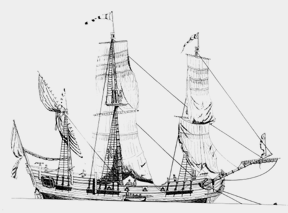 Hope
everyone's ready to party at the "White House" when PBO signs
the Reform Bill into Law! I'm partying at the "Brown House" as
we speak!!
Hope
everyone's ready to party at the "White House" when PBO signs
the Reform Bill into Law! I'm partying at the "Brown House" as
we speak!!
Making history
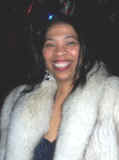 November 7, 2009 9:55:19 PM
November 7, 2009 9:55:19 PM
From:
President Barack Obama
To: Ruby Waller
This evening, at 11:15 p.m., the House of Representatives voted
to pass their health insurance reform bill. Despite countless
attempts over nearly a century, no chamber of Congress has ever
before passed comprehensive health reform. This is history.
But you and millions of your fellow Organizing for America
supporters didn't just witness history tonight -- you helped
make it. Each "yes" vote was a brave stand, backed up
by countless hours of knocking on doors, outreach in town halls
and town squares, millions of signatures, and hundreds of
thousands of calls. You stood up. You spoke up. And you were
heard.
So this is a night to celebrate -- but not to rest. Those who
voted for reform deserve our thanks, and the next phase of this
fight has already begun.
The final Senate bill hasn't even been released yet, but the
insurance companies are already pressing hard for a filibuster
to bury it. OFA has built a massive neighborhood-by-neighborhood
operation to bring people's voices to Congress, and tonight we
saw the results. But the coming days will put our efforts to the
ultimate test. Winning will require each of us to give
everything we can, starting right now.
Can you donate $25 or whatever you can afford so we can finish
this fight?
Tonight's vote brought every American closer to the secure,
affordable care we need. But it was also a watershed moment in
how change is made.
Even after last year's election, many insider lobbyists and
partisan operatives really thought that the old formula of scare
tactics, D.C. back-scratching and special-interest money would
still be enough to block any idea they didn't like. Now, they're
desperate. Because, tonight, you made it crystal clear: the old
rules are changing -- and the people will not be ignored.
In the final phases of last year's election, I often reminded
folks, "Don't think for a minute that power concedes
without a fight," and it's especially true today. But
that's okay -- we're not afraid of a fight. And as you continue
to prove, when all of us work together, we have what it takes to
win.
Please donate to OFA's campaign to win this fight and ensure
that real health reform reaches my desk by the end of this year:
https://donate.barackobama.com/History
Let's keep making history,
President Barack Obama
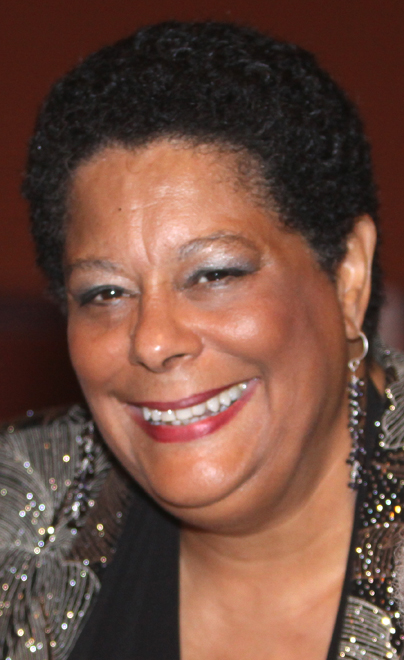
November 8, 2009
On Saturday, November 7, 2009, a bipartisan majority of the House of Representatives made history by passing H.R. 3962, the Affordable Health Care for America Act.
After nearly a century of bantering, this was the first time a chamber of Congress has ever passed comprehensive health insurance reform. This is a historic accomplishment and, after traveling to five continents and living on three for long periods of time, I can truly say I am proud to be an American on this day.
Representatives who voted for this bill deserve thanks for resisting tremendous pressure from the insurance industry lobbyists and standing up for their constituents. Finally, they have put the American people before this insatiable industry that made the bulk of its money from the
Trans-Atlantic slave
trade.
Those who did not vote for the bill have one last opportunity to reconsider and support reform in the upcoming final House vote – and they should do so or be removed from office, since it is the American people who should be their focus and not big business.
A vote for this bill was a vote to provide secure and stable coverage for Americans with insurance, expand coverage for those who do not have insurance, lower costs for families and businesses, and begin to reduce the deficit. It indicates that, finally, this nation is coming out of puberty into adulthood.
Sincerely,
Joan Cartwright
What is good health?
Swine Flu - If you wake up looking like this, don't go to work.

"Who looks outside, dreams; who looks inside, awakens." --
Carl Gustav Jung
Joan,
I think you are absolutely right about what might be called the spiritual and psychic causes of dis-ease. I believe it was Thoreau who was quoted, way back then, as saying that "Most Americans live lives of quiet desperation." Most of us become aware quite young of the fact that most people in this country, as you very accurately point out, do not like what they do for a living. Most do not look forward to going to work, or feel any accomplishment when thy return from it. Instead, and on the contrary, there is far too much of the stereotype, which is far too true, of the person, having endured a full day of insults and being demeaned, coming home, kicking the cat, cursing the spouse and children, and generally seeking some relief or escape in drink, TV or some other non-productive (or even destructive) behavior.
The insults don't have to be (and usually aren't) of the blatant verbal and physical kind that so many of our generations have experienced in the racist South, during slavery and its continuing manifestations. They are more subtle, and they pervade the executive suite as much as they do the mindless assembly line: the constant reminder that the machine is more important than you, for example. If your arm got caught in it and brought it to a halt, the main concern would be the stop in production, the loss of profit and the damage to the machine, with more anger and frustration directed at the hapless employee than care or compassion, much less anything like a social safety net to ensure that you will be hospitalized and treated with your well-being, not the hospital's profitability, as the first consideration. Metaphorically, the same applies to those "middle class" (the great myth: "middle" of what? Halfway between the minimum-wage worker and the wealthiest 1%?), so-called "white collar" positions for which the primary qualification is being a slave to debt.
We diligently teach our hopeful youth about impressive resumes, good grooming and interview techniques in order to secure a "real job," only to find that what interests too many prospective employers is whether the prospective worker is married, has a house, etc., which will ensure such a dependency on the income earned that he or she will follow orders as told, all the while being encouraged to incur more debt in order to "keep up appearances" of supposed importance, like country club fees, expensive wardrobes, overpriced real estate, etc.
It is true that my
wife and I "Don't get around much anymore," even to hear our
favorite music, because -- well, you know -- the lifestyle choices we have
made end up being pretty demanding timewise, but I appreciate your
invitation and all the reminders you send of what we have been missing.
(Same is true, by the way, of movies, plays and even art exhibitions, but
we do what we must and, more importantly, don't hate what we do in our own
small efforts to "make this a better world.") Projects and
commitments, duties and obligations, trying hard at the same time not to
get so stretched that we are unable to do any of these things really well,
which we must if they are worth doing at all, but having that profound
satisfaction of Giving Back and Giving Forward, is so much of what it is
really all about. My abiding hope is for these things to be
inspiration for, rather than distractions from, producing art-- of
the tangible variety, as you do too-- but also
art-as-life-and-life-as-art.
This year has been quite sobering in many ways and I am trying to hold on to the lessons that the Spirit has been bringing my way, without backsliding into the old habits. When a sibling passes on, as my brother did in June, it is certainly another kind of awakening. I have been reminded, and have reminded others when I need to keep on reminding myself, of that little Parable of "Walnuts and Rice" that I even heard made into a folk song.
Take two quart-sized jars and fill each 3/4 full, one with walnuts and one with rice. Try to pour the walnuts into the jar of rice, and of course, they won't go, but pour the rice into the jar of walnuts and no problem.
The walnuts are the important things in life -- family, friends, relationships, caring -- while the rice represents all the other stuff -- jobs, titles, projects, political struggles, what we do for money, etc. If we fill our lives with first things first, all that stuff, the "rice" will find its place comfortably within the important things. Whereas, if we put the other things first, we literally leave no room in our lives for what really matters.
I'm slowly getting it, as
in the full and sudden realization that I now have to be the new
Dad to my brother's grown (but not all that grown) son and daughter.
Even sharing this with you is a timely little pep talk to myself not to
forget what the Spirit is showing me.
Those little awakenings are great reminders of how questionable it might be for some of us to be "married to our work," no matter how much we might like or love it. But those of us who are blessed, as one of my sisters reminded me many years ago, to be engaged in creative work -- art -- are truly blessed.
What makes this communication from you so special is that you are actually engaged in an art form which is so much more than art. The African American Classical Music known as Jazz is the very model of what life is and how it should be lived. Every individual in it is so unique, and so necessary to making it a reality, while that reality is so much larger and more important than any of us individuals.
I often quote veteran drummer Johnny Greer's advice to a young Joe Williams, when he joined the heady Duke Ellington Orchestra: "The vocalist's job is not to get in the way of the music."
How true of every player, and every person. Jazz has been the guiding force of practically my entire adult life. It is the ideal model, comparable to the Flight of Geese, for social organization (as opposed to, say, the corporate bored-room), it is the metaphor by which I taught both my daughters to drive ("the traffic is music; the driver's job is not to get in the way of it"), it is the comparison that I strive to reach in visual art: If I can execute this with the same virtuosity of Trane, Miles or Aretha -- or Joan Cartwright -- I just might be giving something to the world.
I think you can sense from this that even though you may not have been seeing us at your performances -- and I'm not saying that you won't -- we are so much more connected with you than any of us might think. It sometimes takes a moment like this to pause and reflect in order to appreciate -- or, more accurately, become aware of these wonderful connections in our lives. Of course, the truth is that everything in the universe is totally connected, nothing is disconnected; what is lacking -- and so often causes "lives of quiet desperation" among other symptoms, like dis-ease -- is our awareness and awakedness to this simple truth.
"Intelligence," on the real side, might be defined simply as awareness, and the measure of it is how connected we are aware of being. Few modern human endeavors -- intellectual pursuits, technology, hard labor, religion, athletics, politics -- come anywhere as close to manifesting our connectedness, at least from my perspective, as Jazz. It seems that all these others are at their best when they are animated by the principles of Jazz.
It might not have been called literal Jazz, but I once witnessed an unforgettable moment of truth when soprano Jessye Norman at a church gathering spontaneously sang the old spiritual "O, Freedom!," and the entire audience, including all the tough guys, was helplessly reduced to tears. That can neither be faked nor denied.
That is what it is all about: the universal, deep Truth that unites everything and everyone.
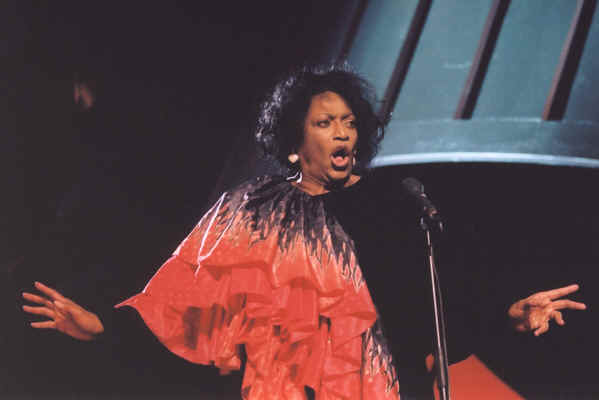
Jessye Norman
As the voice of our people, our experience, our pains and aspirations, our lessons learned and lessons to teach, Jazz, I feel, is for us -- particularly in these artificial urban environments, which need to be recognized for the otherwise spirit-breaking settings that they are -- our reconnection to the wisdom we once had as free hunters, gatherers, cultivators, healers, artisans and people who owned our own lives. It is the voice, barely mellowed and refined by the healing force of time over centuries, of all those inchoate wails, prayers and curses of scattered souls packed into slave ships but with the resolve to keep and bring sanity at any cost.
Dr. Alfred Pinkston,
a genius at understanding the link of history to music, returned to
There's a Black man. Let's call him Willie. He's sitting out in front of his house on a Saturday morning, whittling on a stick. The white man arrive.
"Good morning, Willie," he says.
"Good morning, Mr. John."
"OK, Willie, I'm going to go in and see Sarah, now."
"Yes sir, Mr. John."
When the white man has finished and is leaving, he says, "All right, Willie, I'll see you next Saturday."
Willie replies, "Yes sir, Mr. John."
After Mr. John has gone, Willie, who has not missed a stroke in his whittling all this time, goes to humming. 'MMMMmmmmMMM...'
"That humming?"
said Dr. Pinkston, "That's Jazz. So don't say you 'don't know
anything about Jazz."
I heard an African-Cuban Yoruba priest once explain that "with all of the death, the pain and the suffering that was caused by the slave trade, this was the means by which the Ancestors saw fit to bring us here, because the African genius was absolutely required to be here, to prevent this from becoming a disaster that would have been beyond anyone's power to imagine. I have since heard many adherents of the Yoruba tradition on this side of the water echo that same concept. As I heard it from a young woman from Bahia, Brazil, where "the population is 98% Black but the 2% of whites hold all of the positions of power, the people agreed that they did not have the weapons to control their situation militarily. They did no have the money to control it, economically. They did not have the clout and connections to control it politically. But culturally, they would not only rule Bahia, but all of Brazil.
So
said, so done. When I think of how Jazz and, more recently, hip hop
emerged out of the blues and some of the sacred rural traditions in the
urban settings to become what the Jazz Room at Old Dillard Museum calls
"the Language of the Soul," and has reached worldwide audiences
across all barriers and boundaries, I find this to be confirmation of that
notion that our presence where we are has a whole lot more meaning than
being "slaves" and their descendants.
All this having been said, to come back to your original point about healing and wellness, Islam wisely teaches that our worst enemies are within ourselves: our weaknesses, our fears, our ignorance, our laziness, our corrupt desires, that keep us from sharing the peace (salaam) of being one with God. It is one thing to know this, but it is another to find a real way, in our situation, to address this proactively, to rise above the lies and myths and self-loathing, which allow those enemies a place at all in our lives, and I have to believe that the spiritual practice of Jazz-as-a-way-of-life is very much the path to righteousness.
I have long been fascinated with a similar tradition from another place, which is the Hula discipline of Hawai'i, where the official motto of the state, and the former Kingdom, translates as "The life of the land is perpetuated by righteousness."
A woman who teaches the discipline was once explaining on the radio that "it is about having our relationship Right with God, with nature, and with the rest of humanity and this is achieved by practicing doing the right thing, in the right place, with the right people, in the right way, at the right time, the first time."
I thought of how much more sense that made as a goal for living than, say, the material "bottom line at the end of the day." But then I thought how this is about as close to an accurate description of Jazz as anyone could come who was not actually describing the music and what it means. The deep irony in much of this, of course, is how much jazz has been associated with just the opposite: drug and alcohol addiction, actually casualties of chemical warfare, if the truth is to be told, abusive relationships, etc. But, YOU have it right.
I will conclude by saying that I am convinced that art and culture are a force -- maybe THE force -- that will, more than any other, heal, change, empower and uplift our species. Art enhances, enlightens, and enlivens all other endeavors. It's not for nothing that the very purpose of Jazz is, in a manner of speaking, to reach audiences.
Football coach Herman Edwards is frequently quoted for making famous the statement that "The reason we play the game is to win."
This is what makes me such a strong believer in public visual art. Have we noticed that in traditional African villages, the art is always on the OUTSIDE of the houses?
If we
can beautify our neighborhoods and our environments, and make them places
of pride and spiritual strength, just as if we can make our truest music
become the orchestration of our daily lives, I think we will have taken
huge steps toward wellness and preventive medicine, and away from the
spiritual, psychic, financial and social drain that we now battle against.
Dare I say, it might even get our "walnuts and rice" priorities
in order.
Thanks, Joan, for all that
you do in bringing some light to this world. Stay healthy, live
long, sing much, and be blessed!
Peace & Love,
October 15, 2009
My best friend in Georgia left
I think everyone should stay home.
A/C and germs floating around in offices have always been unhealthy for
millions of people who only consider the check at the end of the week and
not their health. I've been self-employed the better part of my life and
don't have health insurance at all and I'm just fine.
The reason why I know about catching virus from airborne germs is because I caught one in China in the apartment I lived in, where the toilet upstairs was leaking into my bathroom. I couldn't talk or sing for three days. I was really miserable and it wasn't like any cold I ever experienced in my entire life.
The world is full of disease,
simply because people are so unhappy with what they are doing. I love what I
do as a Jazz artist, even though I struggle from month to month to make ends meet.
Thanks
Joan
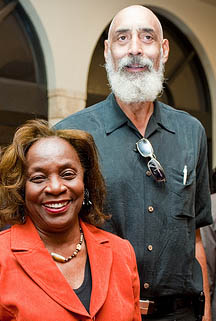
Drs. Wallis and Gene Tinnie
Gene's poignant responses:
"Middle Class"
The great myth: "middle" of what?
Halfway between the minimum wage worker and the wealthiest 1%
Cultural Work - Art
Those of us who are blessed, as one of my sisters reminded me many years ago, to be engaged in creative work -- art -- are truly blessed.
What makes this communication from you so special is that you are engaged in an art form that is so much more than art. The African American Classical Music known as Jazz is the very model of what life is and how it should be lived.
Jazz has been the guiding force of practically my entire adult life. It is the ideal model, comparable to the Flight of Geese, for social organization, the metaphor by which I taught both my daughters to drive.
"The traffic is music; the driver's job is not to get in the way of it"
It is the comparison that I strive to reach in visual art. If I can execute this with the same virtuosity of Trane, Miles or Aretha -- or Joan Cartwright, I just might be giving something to the world.
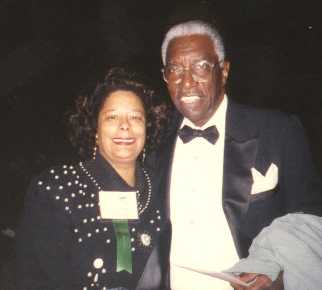
JC and Joe Williams
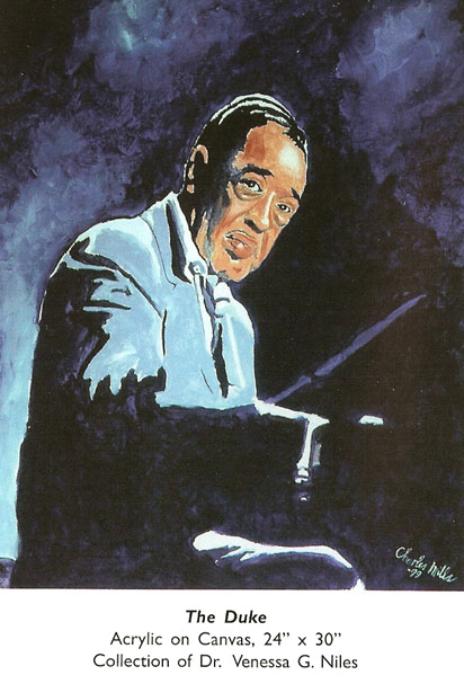
Duke Ellington by Charles Mills
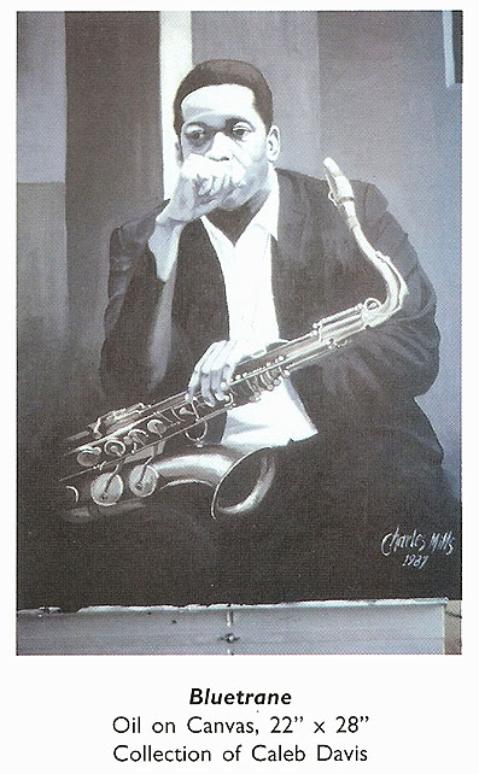
John Coltrane by Charles Mills
As the voice of our people. . .Jazz is. . . our reconnection to the wisdom we once had as free hunters, gatherers, cultivators, healers, artisans and people who owned our own lives. It is the voice. . .of all those inchoate wails, prayers and curses of scattered souls packed into slave ships but with the resolve to keep and bring sanity at any cost. -- Dinizulu Gene Tinnie
A Slave Ship Speaks
The Wreck of the Henrietta Marie
I have to believe that the spiritual practice of Jazz-as-a-way-of-life is very much the path to righteousness. -- Dinizulu Gene Tinnie
Art and culture are a force -- maybe THE force -- that will, more than any other, heal, change, empower and uplift our species. Art enhances, enlightens, and enlivens all other endeavors. It's not for nothing that the very purpose of Jazz is. . . to reach audiences. -- Dinizulu Gene Tinnie
Talkin' That Jazz by Joan Cartwright


